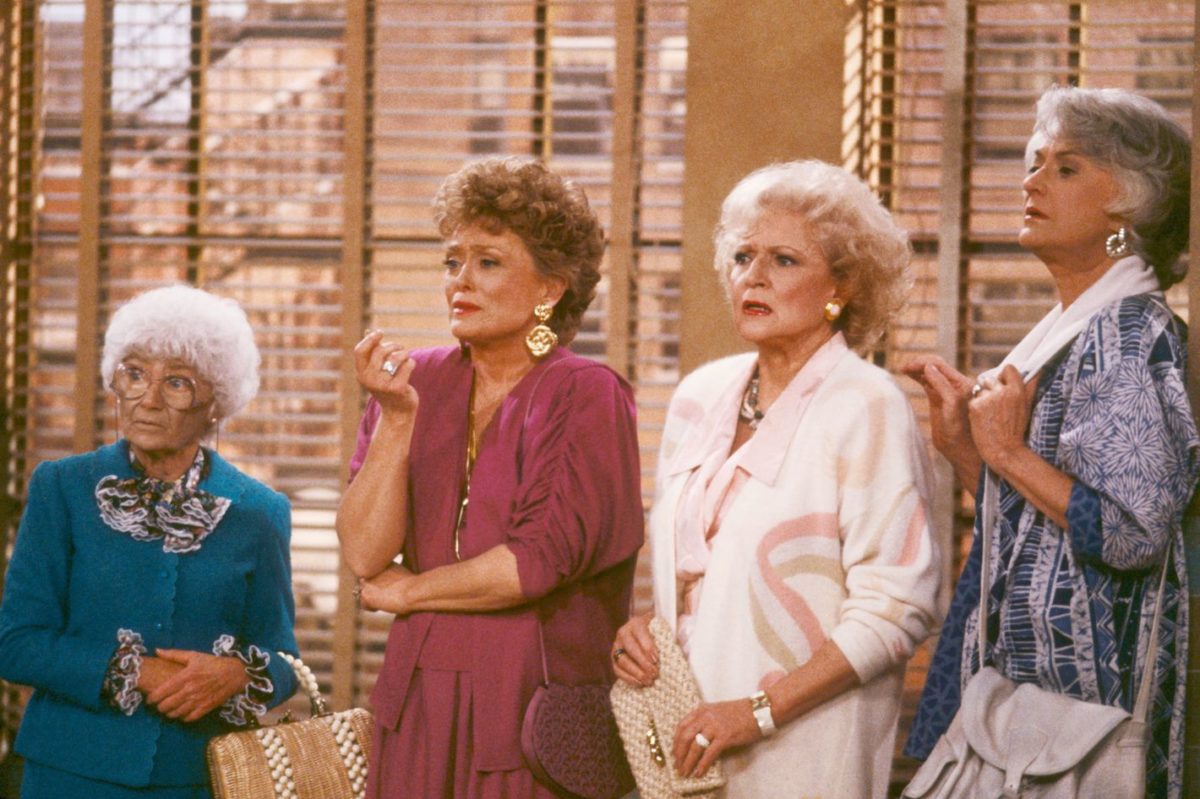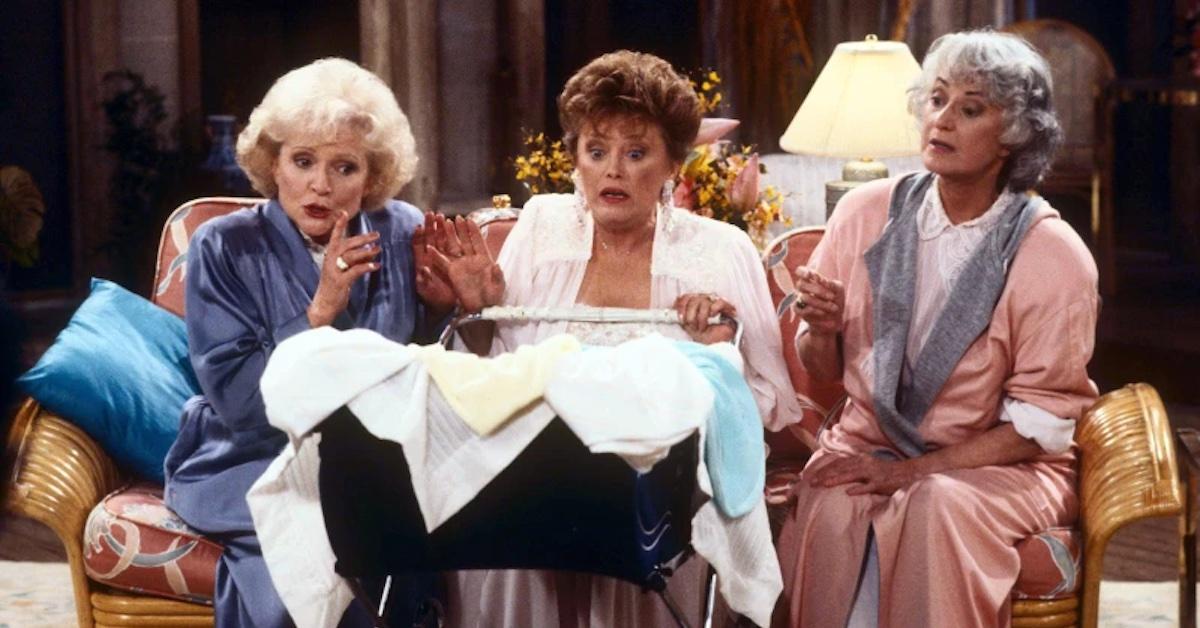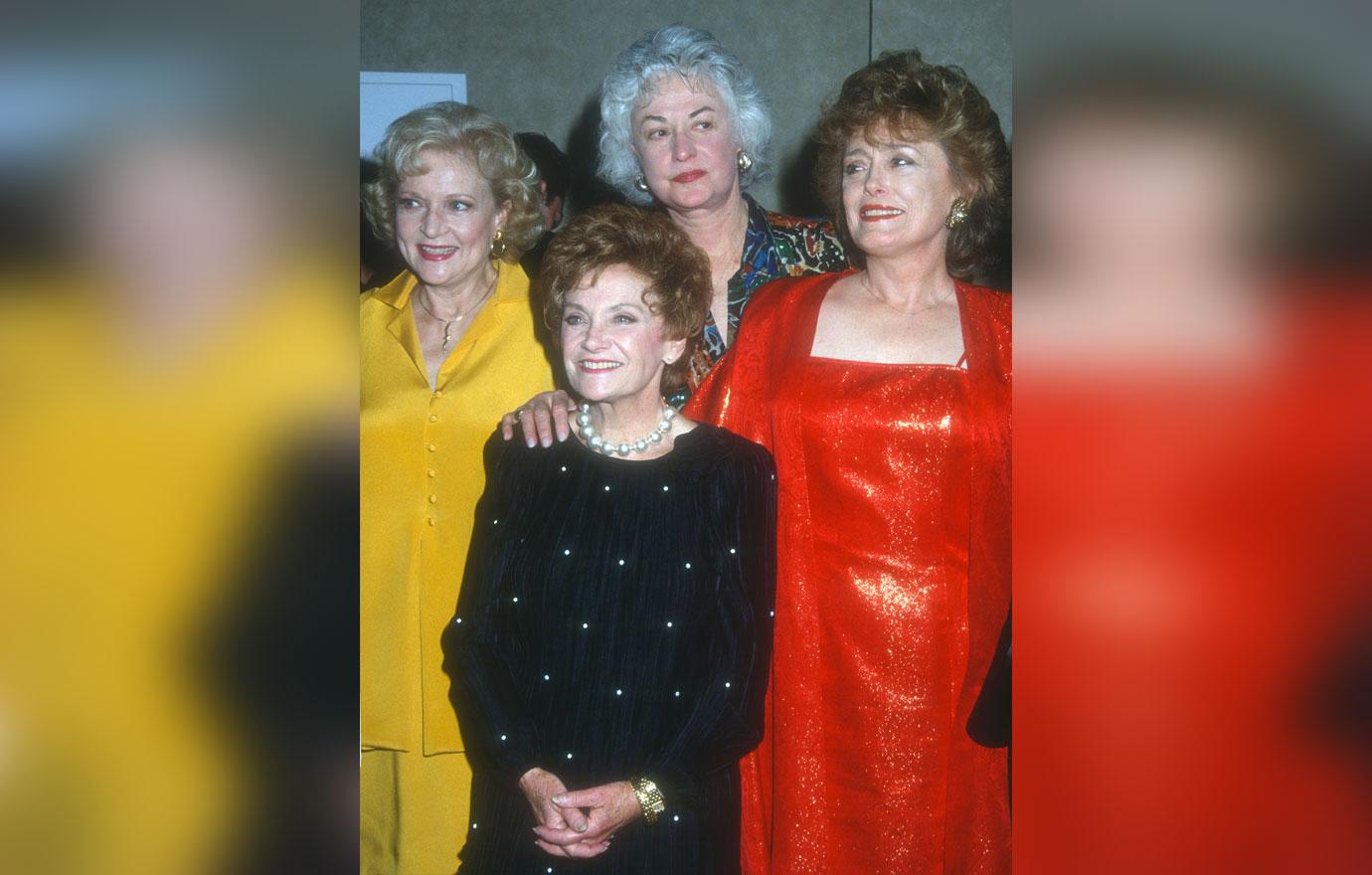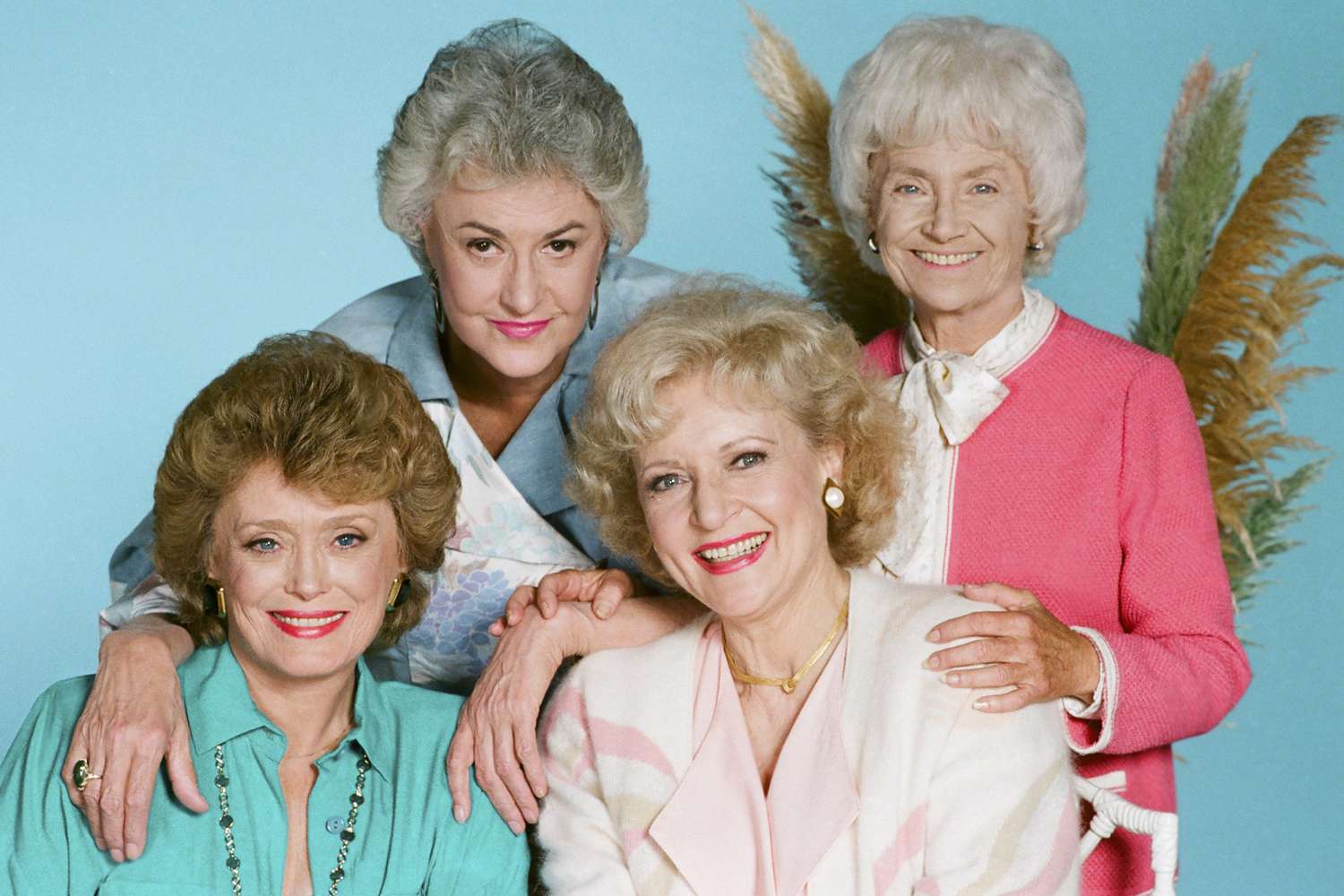Table of Contents
On-Screen Chemistry, Off-Screen Tension
The Golden Girls viewers had the portrayal of Dorothy, Rose, Blanche, and Sophia as the very epitome of forever. In contrast, the lives of their characters’ – Bea Arthur, Betty White, Rue McClanahan, and Estelle Getty – were a bit different and not always tranquil. “Break out the cheesecake”: The Golden Girls was initially aired 40 years ago. The cast members who brought the show to life are no longer with us, yet the magic that they had is still very much alive.
In that period, the four ladies’ strong personalities sometimes led to disputes with each other. “When that red light was on [during filming], there were no more professional people than those women,” series co-producer Marsha Posner Williams recalled at a 40th anniversary celebration for the show, part of the Pride LIVE! Hollywood festival. “But when the red light was off, those two couldn’t have been any more distant from each other.”

Contract Disagreements and Award-Acceptance Speeches
As Marsha Posner Williams recalls, the three actresses, Betty White, Rue McClanahan, and Estelle Getty, could not wait to ink new deals after having their sitcom triumphant for seven seasons, but Bea Arthur refused absolutely, saying, “No f–king way.” Later on she made the choice that led to the spin-off The Golden Palace, a short-lived series that showed Rose, Blanche, and Sophia running a hotel.
Nevertheless, off-stage stories about conflicts don’t lessen the charm of The Golden Girls. On the contrary, The possibility that Arthur and White may have been the Kim Cattrall and Sarah Jessica Parker of their day only adds to the show’s fascination, which is still endlessly rewatchable. Moreover, they were not only good times between them off camera.
“We’re a matched set, you can’t split us up,” White said during her 1986 Emmy acceptance speech after winning Best Actress in a Comedy Series for her role as the lovable Rose Nylund. It was her only Emmy win for the series, though she was nominated every season it aired.
Emmys Wins for The Golden Girls
The awards were not late to follow the success of the series.
Rue McClanahan earned the 1987 Emmy Award for her portrayal of Blanche Devereaux, the bright and vivacious Southern belle, after receiving four nominations. Bea Arthur followed in 1988, winning for her sharp-tongued turn as Dorothy Zbornak—her only victory out of four nominations. Estelle Getty, who played Dorothy’s wisecracking mother Sophia Petrillo (though she was a year younger than Arthur), received seven nominations for Best Supporting Actress in a Comedy Series and won in 1988.
The show itself also claimed the Emmy for Outstanding Comedy Series in both 1986 and 1987.

Emmy Rivalries and On-Set Coolness
In her 2007 memoir My First Five Husbands…and the Ones Who Got Away, Rue McClanahan conceded that it seemed “awkward” for the cast to be pitted against each other at the Emmys every time. She also figured out that Bea Arthur was not happy about losing—be it to Betty White or to McClanahan herself—although Arthur got the highest paycheck as the most famous actress from the group of that time.
Betty White recounted the situation from her angle in her 1995 memoir Here We Go Again: My Life in Television. She remembered after her first Emmy win, “Estelle gave me a big hug and kiss—but she did it outside, before we got into the studio. The crew couldn’t have been warmer or sweeter, but the congratulations were all whispered.”
Yet, White remarked that as time went on and The Golden Girls kept winning awards, “the first year’s coolness was never allowed again. We celebrated!”
Casting Switch-Ups Before the Show Began
While Betty White and Rue McClanahan had already an established rapport, NBC was casting The Golden Girls. The two actresses had previously worked together on Mama’s Family. “We adore each other,” said White of McClanahan, whom she affectionately nicknamed “Roozie.”
What is more, the characters they became were not the ones for which they were initially supposed to. In fact, White was first of all seen as Blanche Devereaux, which would have been an obvious choice considering her two-time Emmy-winning performance as Sue Ann Nivens on The Mary Tyler Moore Show. On the other hand, producers were for McClanahan wanting Rose Nylund, suggesting the talent of the actress from the character of Vivien, the dumb neighbor, in the All in the Family spin-off Maude.

Finding the Right Roles
Rue McClanahan in her memoir, reminisced about her initial feeling that the character Blanche Devereaux was her destiny – and she admitted being secretly happy when the pilot director, in the middle of her audition, asked her to take another role. The very next day, Betty White performed a reading with her as Rose, which so perfectly caught the spark that the show would go on to have.
McClanahan also recounted the incident when she was asked to convince Bea Arthur to join. It was like striking the match: Arthur’s sharp, no-nonsense Maude Findlay character logically led to The Golden Girls’ quick-witted divorcée, Dorothy Zbornak.
Completing the Foursome
In her autobiography, Rue McClanahan described Bea Arthur’s reluctance to accept the idea. “Rue, I don’t want to do ‘Maude and Vivien Meet Sue Ann Nivens.’ Boooorrrring!” she recalled Arthur saying.
Nevertheless, after Arthur found out that White and McClanahan had switched turns, she got hooked. She told E! News in 2002 that it was the script that convinced her: “It’s genius—it’s funny, it’s mature, and I still can’t help but go on again. I didn’t know it was going to become a cult [classic]. I just thought it was great.”
The last spot was for Estelle Getty, a stage actress from New York who was mainly known for her dominating Broadway role as the grandmother in Torch Song Trilogy. After her arrival, the foursome was complete.
As McClanahan noted, “The chemisty was undeniable, the love for our set was obvious to us.”
:max_bytes(150000):strip_icc():focal(725x131:727x133)/betty-white-and-bea-arthur-conflict-021224-2-59dadb6946624a09964f03b945de6dbb.jpg)
Backstage Conflict
Despite that, Rue McClanahan admitted that there was a little bit of “not everything” between Bea Arthur and Betty White. “I love both Bea and Betty and got a huge kick out of each of them,” she wrote. “Their relationship with each other wasn’t all I wished it could be, but it never interfered with their work.”
On the contrary, Arthur told E! News, “It was a brilliant working relationship, everybody. There wasn’t a weak link in the whole thing.” The show was great professionally, like the personal issues that became lighthearted joking were only very rarely revealed.
In a later interview with the TV Academy Archive of American Television, McClanahan reminisced about Arthur’s eccentricities and said, “Bea is a very, very eccentric woman. She wouldn’t go to lunch unless Betty would go with her.”
Off-Screen Rituals
Bea Arthur and Betty White had their individual off-camera habits that were unknown to most. White was often late, but Arthur would still wait for her. It was a weekly Friday night event that the cast shared dinner after filming and the two always sat next to each other. White wrote in her 1987 autobiography Betty White in Person that she and Arthur not only had lunch together daily but also agreed that Bea Arthur was a true food lover—though she could be a little annoying because of that.
White refers to her friends as “discriminating, knowledgeable, and appreciative…and a little bit of an indigestion when [My] lack of imagination and predictability drives her crazy.”
Estelle Getty, never shy about her opinion, described Arthur’s eating habits with just one word: “Picky.” That, in typical fashion, reportedly got her an angry look from her TV daughter.

Chemistry That Outshone Differences
“But it’s her complete obsession,” Betty White once quipped in a 1986 interview with The Washington Post. “As far as Bea is concerned, it’s better than sex. Eating.”
Rue McClanahan also reflected how astonishing it was that the four women, despite their contrasting characters, were so in harmony in their parts. White, in her memoir, concurred, stating, “There could not be four more different females!”
White, as a showbiz veteran, also acknowledged the importance of their union. In a TV landscape that often portrayed women as rivals rather than friends, The Golden Girls stood out as proof that four strong, distinct female voices could come together to create television magic.
Betty White on the “Feud” Rumors
In response to the ongoing rumors about cast rifts, Betty White stated, “Unfortunately, there are times when rumors have a kernel of truth.” At the same time, she reminded how unfeasible it would be to survive a TV series in such a way. “If you know how much time and personal interaction is required to shoot a TV series, it’s really hard to imagine doing it if you hated each other! It’s bad enough in a serious situation…can you picture doing drama in those conditions?!”
White continued: “I can’t even imagine what The Golden Girls’ set would be like if we didn’t all support and respect each other. It is a fact that we also happened to be crazy about each other which was an added ingredient that could not have been predicted when the show was first assembled.”

Bonded by Grief and Friendship
Betty White and Bea Arthur were deeply linked in the beginning of the show when both of them lost their mothers within a couple of weeks.
White stated in her memoir that her mother died in November 1985 after a long battle with cancer. Only three weeks later, during rehearsal, Arthur got the heartbreaking call that her mother had passed. “She went home but then came back to work the next day, just as I had done,” White wrote. “We were a family, too, and somehow it just seemed the only place to be.”
Since they were together during breaks off stage, they probably talked for hours and would have been reluctant to separate. Suddenly, one of them would laugh and say: “Are we not sounding like Golden Girls?”
Different Styles, Shared Surprises
Rue McClanahan and Betty White both remembered that Bea Arthur, a stage-trained actress, was quite often displeased with White’s “breaking the fourth wall” and talking to the studio audience between takes. McClainhan concurred with Arthur’s perspective, but admitted that he occasionally found himself acting as White’s advocate.
However, in 1987, Arthur, McClanahan, and Estelle Getty came together for a fun moment of their own. The three worked with the producers of This Is Your Life to stage a surprise for White when she thought they were taking pictures. The fake setup allowed her to meet again with a lot of her Mary Tyler Moore Show friends.
Looking back, White said, “Honestly, it was such a fake ordeal but they had to act as if it was a great test of friendship for them going through all that prep…which they hate the most. I’m very lucky!”

Separate Lives Beyond the Set
The four stars of The Golden Girls were, for the most part, very different people off the set and they lived in separate worlds.
Just like her character Rose, Betty White was a widow.
Betty White’s third and final husband, Allen Ludden—whom she deeply loved and had married in 1963—died in 1981. Bea Arthur married and divorced twice, while Rue McClanahan’s colorful love life included five marriages before she wed her sixth husband, Morrow Wilson, in 1997. Meanwhile, Estelle Getty remained married to Arthur Gettleman from 1947 until his death in 2004—but that never stopped her from joking about her situation. She once joked that if Cary Grant, the Hollywood icon, were ever to come to the set, she would be happy to “drink his bathwater”.
Chummy, Even If Not Constantly Together
Rue McClanahan once said that Estelle Getty was the person who liked to have extravagant birthday celebrations annually in the summer, whereas Bea Arthur was the one who would quietly attend one of those dinners that McClanahan could vaguely recall having about 40 guests. Getty once accompanied a Christmas celebration. Besides these instances, the four women were mostly seen together at award shows and work-related events.
Nevertheless, they had an easy rapport. McClanahan used to keep her co-stars of The Golden Girls supplied with tomatoes she grew in her garden, and all fours actresses were fans of animal rights and rescue charities. Getty and McClanahan appeared together in PETA events, while Betty White helped McClanahan to get her third dog with the help of Mary Tyler Moore’s brother.
Not to mention that, as Arthur frequently said, the bickering was so effortless and, therefore, when they were together, they really did sound like Dorothy, Rose, Blanche, and Sophia—except for a few main differences.

Shared Magic, Different Lives On Screen
Estelle Getty was looking around the restaurant while waiting for Bea Arthur and Betty White to arrive for lunch with The Washington Post’s Tom Shales, and she said, “Where are those two older women?” The two got together with Rue McClanahan who was already there and chatted about Getty’s recent Golden Globe win. “It’s with the other icons,” she said with pride, “in my little museum.”
When asked if the cast spent much time together outside of work, Getty confessed, “We all…have such different lives, really. I loved to be with them so much. But unfortunately, they don’t let me. “Still, Arthur often mentioned that the main thing which The Golden Girls could be his favorite was the clever and funny dialogues between Dorothy and Sophia—mother and daughter relationship that has become one of the most iconic co-star interaction in the history of sitcoms.”
A TV Mother-Daughter Bond
“One of my favorite episodes,” Bea Arthur said to E!, “was the one where Sophia signed us up for the mother and daughter beauty pageant at Shady Pines and we ended up doing Sonny and Cher for the talent part, singing ‘I Got You Babe.’ I really did love everything which was related to a mother.”
The fact that both Arthur and Estelle Getty won Emmys on the same night made their relationship particularly special.
“Picture it. California. 1988,” Getty joked in her acceptance speech, thus making the audience laugh immediately. “This is a very big moment for me. I cannot take a lot of time, but I do want to thank the immediate world.”
She next thanked her parents, friends, and the Golden Girls cast in addition to “the reason I’m here, three most beautiful, generous, wonderful, talented ladies—my daughter Bea Arthur, and her two roommates, Rue McClanahan and Betty White.”

A Late Start, But Instant Chemistry
Estelle Getty was 61 when she landed her first major television role, and she admitted the opportunity felt overwhelming. She told The Washington Post, “At my age, it was like a blow to my heart. It was not only frightening to get such a job, but it was scary to step into a room with Betty White, Bea Arthur, and Rue McClanahan.”
White, ever ready with a witty response, quipped, “And don’t you forget it.”
When the cast was asked how they really got along, Rue McClanahan replied, “I mean, I have been with women my whole life and still I am here, so I do not see a problem.” Bea Arthur added her voice, “Me too.” Getty also agreed and said, “My best friends are women.”
Banter On and Off Screen
Betty White jokingly admitted, “Oh, mine aren’t. I like to be with men better. But I get along with women.” Bea Arthur quickly agreed, jokingly adding that White mostly liked “men and dogs.” In true Betty White fashion, she lit up at the idea of the girls having a pet on the show, musing aloud about Rose adopting a rabbit—only for Bea Arthur to silence her with one of Dorothy Zbornak’s trademark eye rolls.
Many expected Arthur to walk away once the cast’s six-year contracts ended, just as she had after six seasons of Maude. But to everyone’s delight, White, Getty, and McClanahan learned that she agreed to stay, which kept The Golden Girls alive for one more season.

Arthur’s Exit and The Golden Palace
Bea Arthur eventually made the decision to leave. “I said, we really did it, we got, and why would I hold on and do it just to keep it going, and to go over the same kinds of things again?” she told E!. “We’re never going to—not be as successful, but it’s never going to be as creatively fulfilling for sure as during the first five years.”
The show ended with a hilarious episode where Dorothy marries Blanche’s rich uncle, played by Leslie Nielsen. After her exit, the trio—Betty White, Rue McClanahan, and Estelle Getty—announced their participation in the spin-off The Golden Palace. In the spin-off, Rose, Blanche, and Sophia ran a Miami hotel, with Don Cheadle introduced as the manager and Cheech Marin as the head chef. However, because the series aired on CBS instead of NBC, it only lasted one season before cancellation.
Saying Goodbye to the Golden Girls
Despite being the eldest of the four Golden Girls stars, Betty White was the one who survived them all—she died December 31, 2021, only 17 days shy of her 100th birthday.
Estelle Getty was the first to die, aged 84, July 22, 2008, after a near 10-year struggle with Lewy body dementia. Bea Arthur, in her tribute statement, paid her respects, “Mother-daughter relationship was not only ours but the greatest of the comic duos and I will miss her.” White also said, “What makes it possible to bear the loss of Estelle at this time is the fact that although she has left us, Sophia will always be there.”
Less than a year later, April 25, 2009, Arthur herself passed away at 86. The youngest of the four, Rue McClanahan, died June 3, 2010, at 76.

A Legacy of Laughter and Lasting Bonds
In her 2010 update for the paperback edition of Here We Go Again, Betty White revealed that the death of her three Golden Girls costars “has been very hard to take. When you do so much, work so closely, for such a long time, and are lucky enough to have success, you end up being very intimate.”
Rue McClanahan also reflected on that same energy in her memoir, admitting, “As we were all very different in character and personalities, there were times we argued.” But to each of us, both individually and as a group, the most important thing was: the chemistry worked. We were damn funny. And we did it together. That’s what counts at the end of the day.”



